

Can inequality only be fixed by war, revolution or plague? - Open Future. Shrinking Middle. While the global middle class grows, in the West increasing inequality for some drives a relative decline in middle-income populations.
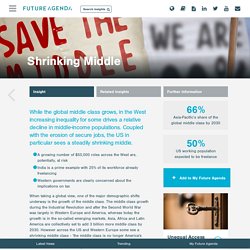
Coupled with the erosion of secure jobs, the US in particular sees a steadily shrinking middle. A growing number of $50,000 roles across the West are, potentially, at risk India is a prime example with 25% of its workforce already freelancing Western governments are clearly concerned about the implications on tax When taking a global view, one of the major demographic shifts underway is the growth of the middle class. The middle class growth during the Industrial Revolution and after the Second World War was largely in Western Europe and America, whereas today the growth is in the so-called emerging markets. Asia, Africa and Latin America are collectively set to add 3 billion more middle class by 2030. Mass Engagement. As the public voice becomes easier to access and harder to suppress, leaders seek to engage to create, develop, secure and maintain legitimacy for their initiatives and policies – so further reducing their hierarchical power.
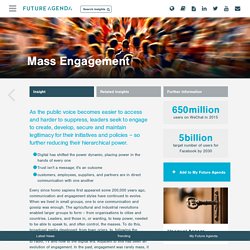
Digital has shifted the power dynamic, placing power in the hands of every one Trust isn't a message; it's an outcome customers, employees, suppliers, and partners are in direct communication with one another Every since homo sapiens first appeared some 200,000 years ago, communication and engagement styles have continued to evolve. When we lived in small groups, one to one communication and gossip was enough. The agricultural and industrial revolutions enabled larger groups to form – from organisations to cities and countries. Declining Government Influence. National governments’ ability to lead change comes under greater pressure from both above and below - multinational organisations increasingly set the rules while citizens trust and support local and network based actions.
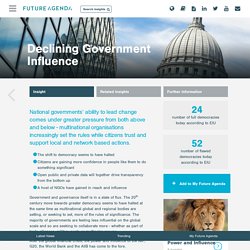
Democracy undergoing 'alarming' decline around the world, study finds. Democracy is undergoing an “alarming” decline across the world as a growing number of countries move towards authoritarian rule, according to the Freedom House think tank. The US organisation’s annual “Freedom in the World” report found 2018 was the 13th consecutive year of deteriorating freedoms around the globe. A total of 68 countries suffered a decline in political rights and civil liberties during the past 12 months, with only 50 counties registering any progress in these areas, it said. Join Independent Minds For exclusive articles, events and an advertising-free read for just £5.99 €6.99 $9.99 a month Get the best of The Independent With an Independent Minds subscription for just £5.99 €6.99 $9.99 a month Without the ads – for just £5.99 €6.99 $9.99 a month.
Coke sits out Super Bowl for pre-game 'unity' spot. Hopepunk, explained: the storytelling trend that weaponizes optimism.
WGSN Designing for Diversity and Inclusivity. En ny krænkelseskultur vinder frem. Søger du information om DR's persondatapolitik Læs mere om DR's persondatapolitik (www.dr.dk/service/drs-persondatapolitik) Hvad er en cookie?

Når du besøger dr.dk eller anvender DR's apps, lagres der cookies på din computer, mobil eller tablet. En cookie er en lille tekstfil, der gemmes i din browser for at kunne genkende din computer, mobil eller tablet ved tilbagevendende besøg. Der er ingen personlige oplysninger gemt i vores cookies, og de kan ikke indeholde virus. Why Trump Won. Asos shock shows UK's economic problems extend beyond high street. Fresh fears are emerging that the British economy is beginning to wilt under Brexit uncertainty after the fashion retailer Asos issued a shock profit warning, causing a plunge in retail shares in the City.
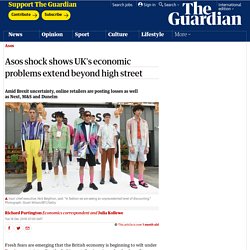
The internet shopping firm warned that UK sales growth would fall short of expectations, raising concerns that consumers are reining in spending against a backdrop of parliamentary deadlock and Bank of England warnings over the economic consequences of a hard Brexit. Income Inequality. 15 ASPECTS THAT HIGHLIGHT HOW GENERATION Z IS DIFFERENT FROM MILLENNIALS. The verdict is still out on where the Millennial generation ends and Generation Z begins.
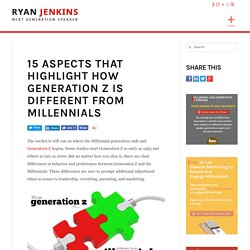
Some studies start Generation Z as early as 1993 and others as late as 2000. But no matter how you slice it, there are clear differences in behavior and preferences between Generation Z and the Millennials. These differences are sure to prompt additional adjustment when in comes to leadership, recruiting, parenting, and marketing. A question I am beginning to get a lot is “Who is Generation Z?” Recently, I did my best to answer that question here. Those that ask the second question are really asking “How do I need to prepare my business, shift my marketing, adjust my leadership, and adapt my recruiting efforts to stay relevant tomorrow?” A democracy deficit plagues the US and the European Union. The European Union and the United States suffer from democracy deficits.
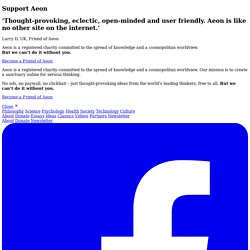
Teaching ‘grit’ is bad for children, and bad for democracy. According to the grit narrative, children in the United States are lazy, entitled and unprepared to compete in the global economy.
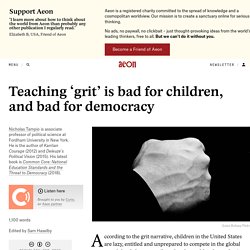
Schools have contributed to the problem by neglecting socio-emotional skills. The solution, then, is for schools to impart the dispositions that enable American children to succeed in college and careers. According to this story, politicians, policymakers, corporate executives and parents agree that kids need more grit. The person who has arguably done more than anyone else to elevate the concept of grit in academic and popular conversations is Angela Duckworth, professor at the Positive Psychology Center at the University of Pennsylvania.